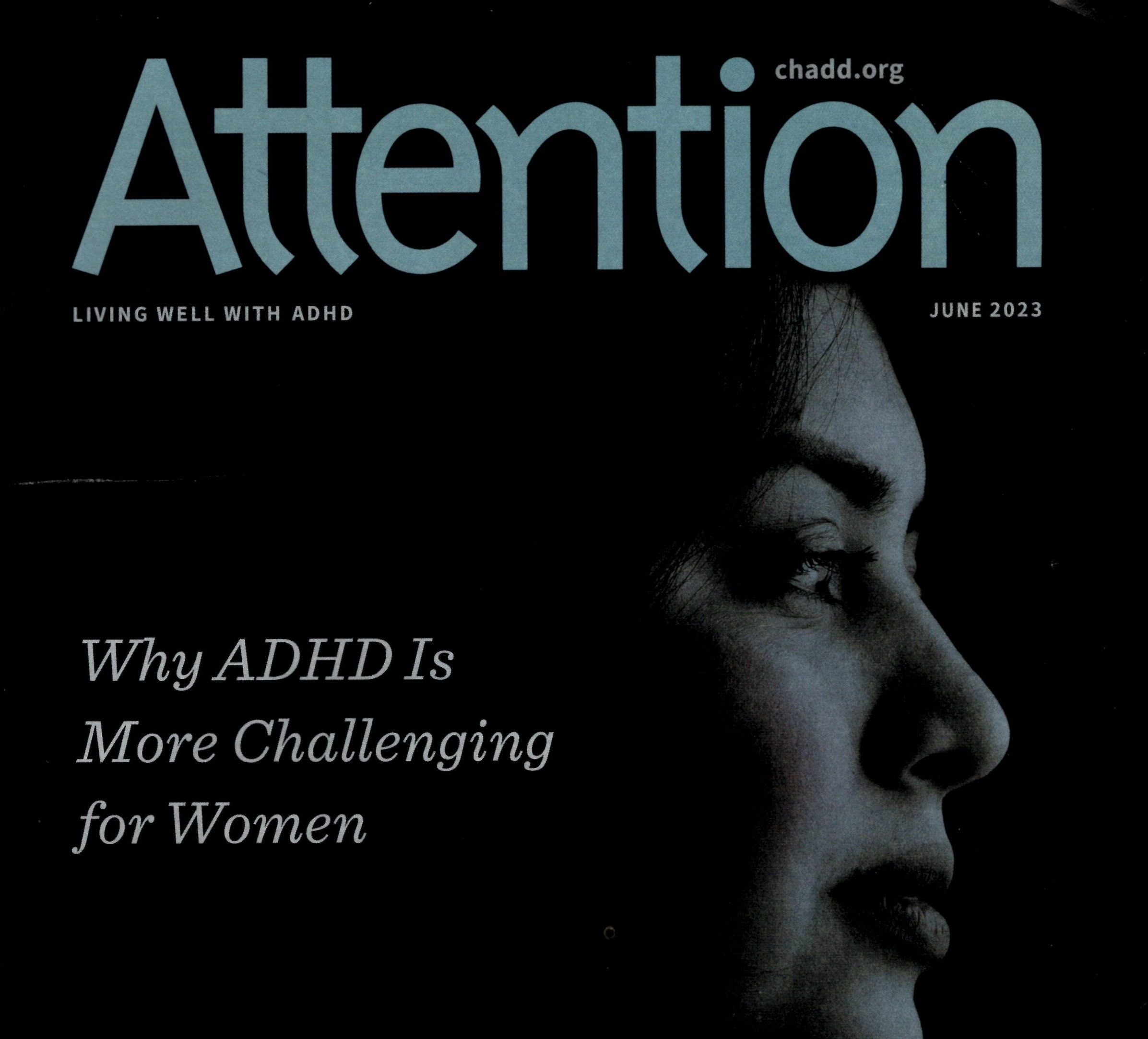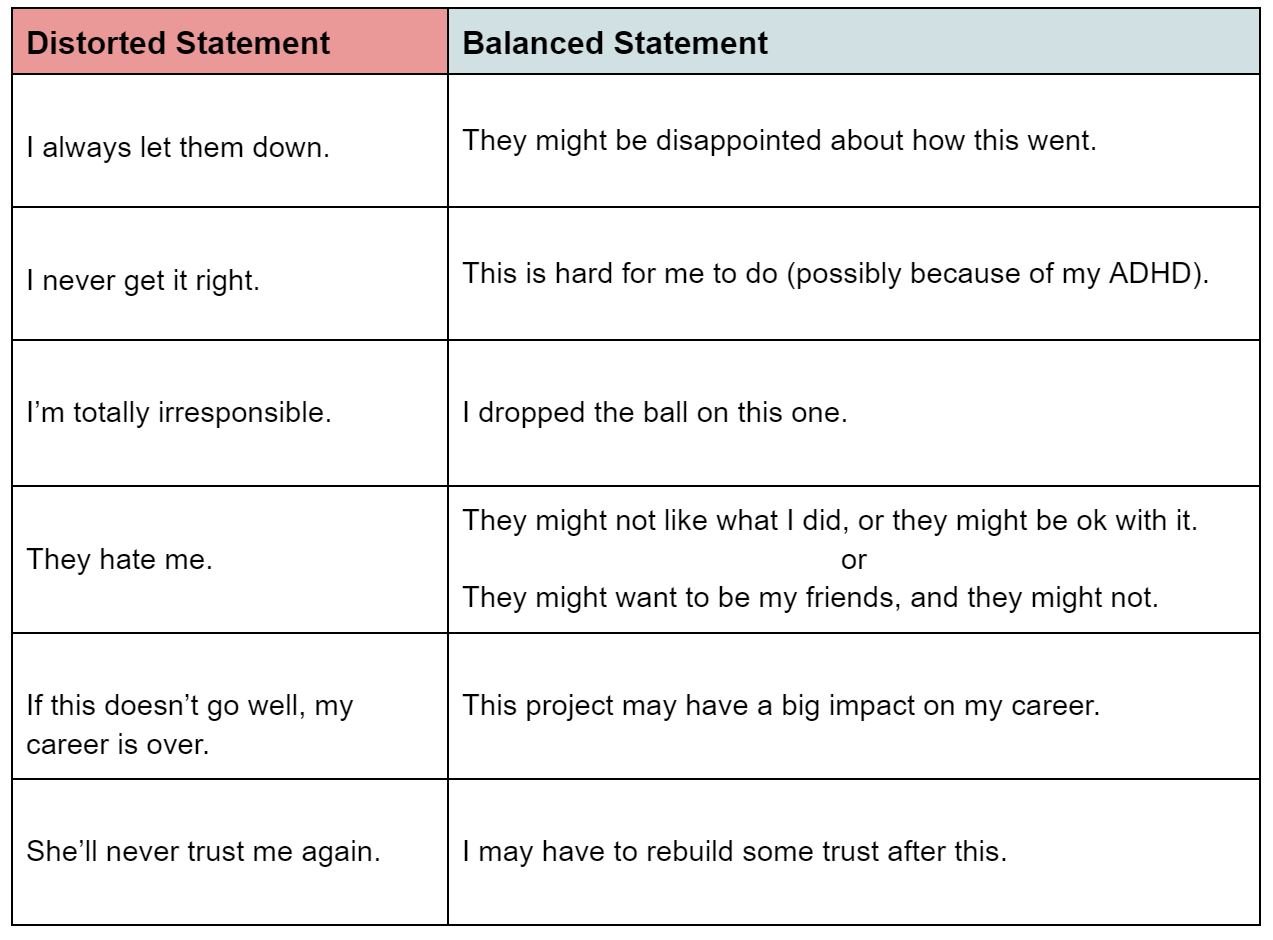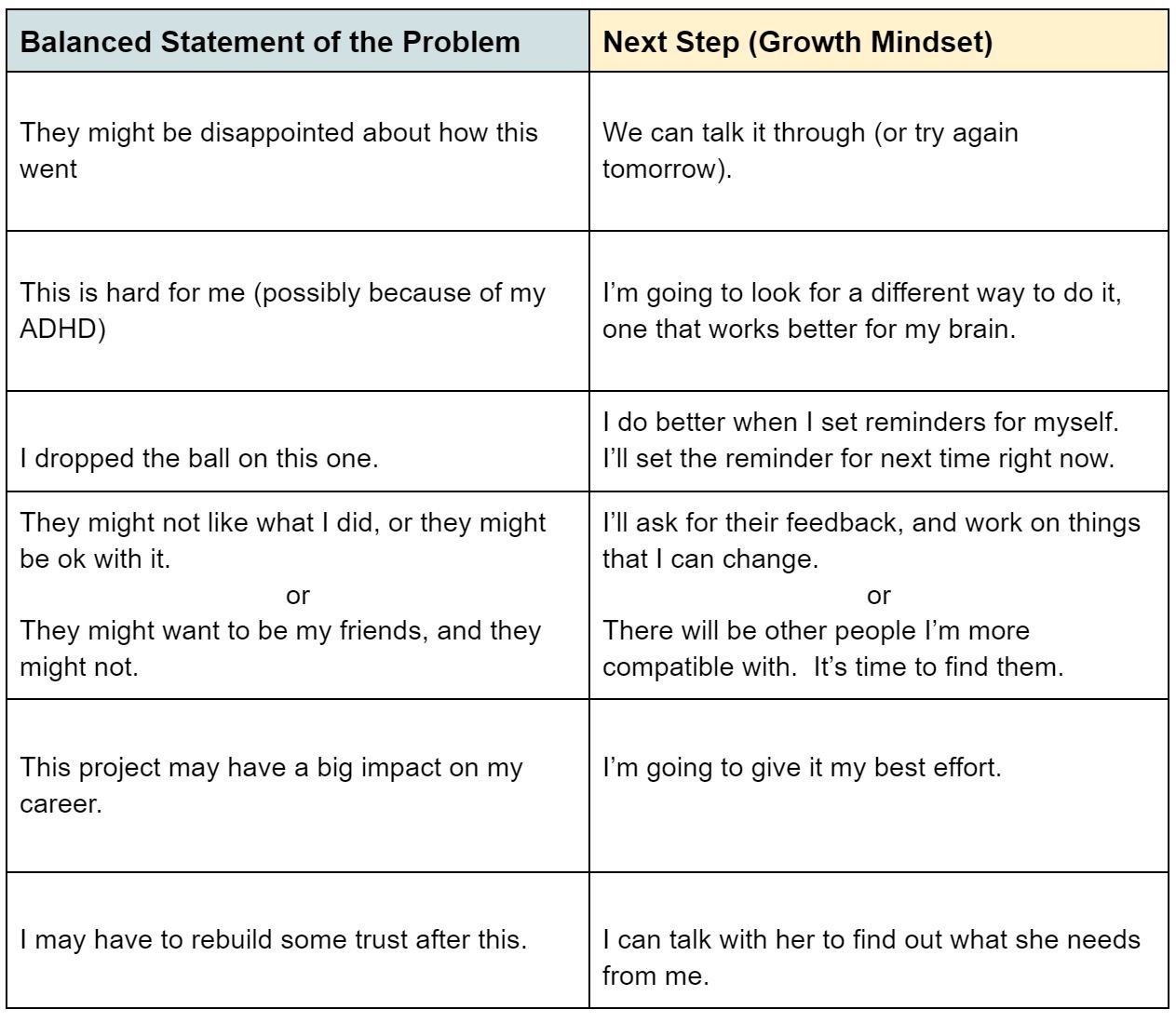Conquering the 3 Mental Enemies of Adults with ADHD
Robin Brannan LCMFT was featured in the June 2023 issue of Attention Magazine (CHADD’s publication about all things ADHD). Check out our summary below. And if you belong to CHADD, you can also click the image to the left to view the article in print form.
A therapist for adult ADHD can help you battle these 3 destructive thought patterns
Imagine it. You really meant to do that project. You thought about it daily. You planned it in your mind. But it didn’t get done.
You promised your child you’d be on time today. That didn’t happen either. You looked at the clock and discovered you were already late. Again.
Before anyone even knows you messed up, you’re on edge. It’s a familiar feeling. Waiting for somebody to be disappointed in you. Or annoyed. Angry, even.
Your mind reminds you, once again, that you’re a failure. A burden. A screwup. (Insert message you’ve heard all your life here.)
These thoughts happen so quickly they’re automatic. We sometimes call them Automatic Negative Thoughts (ANTs). And they hurt.
In fact, they can be the most painful part of adult ADHD. Feeling again and again that you’ve let someone down. You may expect that person to be upset with you even if they aren’t. And because of rejection sensitive dysphoria (RSD)*, you may be hyperaware of their negative feelings.
What is Rejection Sensitive Dysphoria (RSD)?
Many people with ADHD experience RSD, but it isn’t technically part of ADHD. Experiencing RSD means that you feel an extreme emotional pain when someone is unhappy with you (or you think they might be). It feels like rejection. Even if that person doesn’t matter that much to you. And it’s very painful.
How can automatic negative thoughts affect me?
How you think about yourself affects how you feel. If fact, that’s the whole idea behind Cognitive Behavioral Therapy (CBT). How you feel, especially in situations like the ones above, can determine whether you’re living well with ADHD or suffering from it.
The 3 Mental Enemies of Adults with ADHD
There are 3 specific types of thoughts that work together to keep you discouraged. We’ll call them your “mental enemies.” Fortunately, these enemies can be defeated. So get out your ADHD superpowers, and let’s go!
Winning the Battle Against Your Mental Enemies
Step 1: Know what the enemies sound like (to you specifically).
Step 2: Recognize them when they pop up.
Step 3: Use the tactics below (“your secret weapons”) to defeat them.
Enemy #1: Negativity bias
What it is
The tendency of humans to focus more easily on the bad than on the good.** It makes us very aware of problems and blocks us from paying attention to things that are going well.
What it sounds like
Lots of “I should,” “I should have,” or “I need to” statements. And not very many “I have,” “I did,” or “I can” statements.
“I am…” statements that are painful to hear. Things like “I am irresponsible” (or clueless, scatterbrained, lazy). And far fewer “I am” statements that end with words like ready, capable, excited, aware, or resilient.
Why it’s hard for adults with ADHD
Whatever we’re focused on, we are REALLY focused on it. That means those negative thoughts get a lot of attention. And when we’re focused on one thing, we barely notice anything else. The positive thoughts fly right by undetected.
Your secret weapon: An extra dose of positivity
Negativity bias is here to stay. Fight against its negative effect on your mood and self esteem by increasing your dose of positivity. Build a positivity habit into your daily routine.
Set a phone alarm called “3 positives” to prompt you several times a day. When you see it, make 3 positive statements about what’s happening in that moment or since the last alarm.
Write something positive on your mirror every day. It can be as simple as “hello, gorgeous” or “you got this” or more specific to the day ahead. Read it aloud before you brush your teeth. It WILL feel silly, and that’s fine.
Have family members give each other compliments at the dinner or breakfast table.
Carry a gratitude journal and write in it when you notice something good.
Whatever new habit you’re trying to build, be sure to set phone alarms or program a smart speaker to remind you!
Enemy #2: Cognitive distortion/ Catastrophizing
What it is
Cognitive distortion means thinking in faulty or inaccurate ways. Or forming inaccurate perceptions or beliefs.*** The most common forms are “black and white” or “all or nothing” thinking. Cognitive distortion can involve exaggerating the negative consequences of an action or event.** This is called catastrophizing (expecting the worst to happen).
What it sounds like
I never get it right.
I always let them down.
I’m totally irresponsible.
She’ll never trust me again. (Catastrophizing)
They hate me. (Catastrophizing)
My career is over. (Catastrophizing)
Why it’s hard for adults with ADHD
A pattern of catastrophizing can mean more often feeling rejection sensitive dysphoria.* This type of thinking is also a frequent indicator of anxiety and depression, both of which occur often in adults with ADHD.****
Your secret weapon: Balanced thinking (Just the facts, ma’am.)
Practicing balanced (both/and) thinking means replacing language like “always” and “never” with more specific, more accurate statements.
Specific statements describe the actual situation. (“I messed up.” or “This really is a big deal.”) But they leave out the self criticism. And the forecasting of what others will do.
Try saying the statements on the chart out loud. Which feels better: the one in red, or the one in blue?
Enemy #3: Perseveration
What it is
Persistence in doing something to an exceptional level or beyond an appropriate point.*** In other words, doing too much of something or doing it to the extreme.
Can that be a good thing sometimes? Yes! Going to the extreme can mean creating something new or extra special. But when combined with the other 2 mental enemies, it works to keep them ever-present in your head.
Why it’s hard for adults with ADHD
Sounds like ADHD hyperfocus, doesn’t it? So adults with ADHD are quite good at it. Unfortunately that means we can repeat “It’s all my fault” or “why am I such a slob?” over and over. Which can stop us from solving the problem or cause us to get defensive.
There’s another part of perseveration that sounds like our ADHD brains. That is “an inability to interrupt a task or to shift from one strategy or procedure to another.”*** Once we’re in it, our brains want to stay there. Use your secret weapon to get out.
What it sounds like
Replaying an incident over and over in your mind, focusing on what you didn’t do well or should have done instead.
Revisiting the “what if” statements or fears, without considering how likely/realistic they are. And without problem solving.
Your secret weapon: Growth mindset (Action!)
The great news: you’re already partway there! A growth mindset starts with creating a balanced statement of the problem. If you haven’t applied the concept in the chart above to a personal situation yet, pause and try it now.
Remember, the balanced statement is your secret weapon against perseveration. It’s hard to repeat. It’s just not as catchy as our usual negative thoughts! And it lacks the emotional intensity that keeps perseverative thoughts on a loop.
Now think of an action you might take next. Planning your next step (and acting on it if possible) helps you move on from what went wrong.
Practice makes progress, and therapy for adult ADHD helps
And what’s the enemy of progress? Perfections! Remember that this is a learning process. You’re new at this, and mistakes are opportunities to try again. After all, if you got it wrong, that means you tried it! You’re halfway there. Let’s try using the secret weapons one more time before we go.
Imagine you’re trying to use your secret weapons as much as possible. You remember sometimes, but not always. (New skills are easy to forget.) You might think to yourself “I’m so bad at this! I’ll never get it.” Read that statement and try turning it into a more balanced statement. Check the red and blue chart above for ideas if you get stuck.
There are infinite new statements to try. I might say “those mental enemies caught up with me this time.” Or “Oops! I’m catastrophizing!” Or “this isn’t easy for me.” Remember, you’re looking for a statement that tells the truth of what happened (“I forgot to use my secret weapons, even though I meant to.”)
Now try adding a growth mindset statement. Use the blue and yellow chart for reference. We might say “luckily I’ll get more chances to practice.” This one is always true! Notice how you feel about making a mistake when you talk about it this way. Is it better?
How therapy for ADHD can help
Maybe it’s not better. Sometimes we get really stuck. But therapists are trained to help with exactly this type of thing. Most types of therapy use the concepts of Cognitive Behavioral Therapy (CBT) to help clients build skills. Balanced thinking is one of those skills. You’ll find it in CBT, and in DBT (dialectical behavior therapy) too.
You’ll want to look for a therapist who really understands ADHD. So they can help you through what happens with your brain in particular while trying these skills. Expertise in ADHD also helps the therapist debunk the common negative messages all ADHDers have heard.
A therapist who treats ADHD in particular should also focus on helping you create an ADHD friendly lifestyle. This means setting up tools and strategies that work well for your ADHD brain. An ADHD friendly lifestyle helps you experience success more often. And struggle less with your 3 mental enemies.
Finding the right ADHD therapist
It can be hard (scary, even) to trust someone you’ve never met. You’ve likely had experiences with teachers, doctors, and colleagues who judged or dismissed you. Or even shamed you. Others may have looked at your ADHD symptoms as actions you chose to take. And called you lazy or rude.
Always look for a therapist who specializes in working with ADHD and neurodivergent individuals in particular. A great ADHD therapist will find creative strategies that work for you. The CHADD directory can be a good place to start.
Most therapists will talk with you before the first appointment to answer your questions about their approach. (You might have to make an appointment before getting to this step. With us, you do.) If the call doesn’t meet your expectations or doesn’t feel like the right fit, try someone else. A professional won’t be hurt or offended. There are plenty of great therapists to be found, and we believe you deserve to work with the right one for you.
And of course, if you’re looking for an ADHD therapist in Maryland, try us! We look forward to supporting you in living well with ADHD.
Footnotes
*https://www.additudemag.com/rejection-sensitive-dysphoria-and-adhd/
**Vaish, A., Grossmann, T., & Woodward, A. (2008). Not all emotions are created equal: The negativity bias in social-emotional development. Psychological Bulletin, 134(3), 383–403. https://doi.org/10.1037/0033-2909.134.3.383
***American Psychological Association dictionary. https://dictionary.apa.org/
****Hargitai, L.D., Livingston, L.A., Waldren, L.H. et al. Attention-deficit hyperactivity disorder traits are a more important predictor of internalising problems than autistic traits. Sci Rep13, 31 (2023). https://doi.org/10.1038/s41598-022-26350-4




